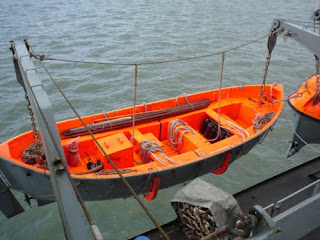
We live in harsh, harsh times. The continued bad economy and relentless bad news in the papers has me thinking about lifeboat ethics once again.
Environmental disasters (like fashion) change with the times. In the early 1970's it was DDT; Silent Spring became a national best-seller and Rachel Carson was a household name. In the 80's, the alarm bells were ringing over global population growth, and concepts like the Tragedy of the Commons and Lifeboat Ethics came into vogue in Geography Departments around the world. In the 1990's, it was acid rain. Now it's the demonization of carbon. As so it goes...
When I was in college, the Big Issue was population growth; Ethiopia was starving, India and China were growing at an alarming rate, and the third world in general was going to be the downfall of us all. Geography Departments were preaching Zero Population Growth (ZPG), carrying capacity was the big buzz and students, including yours truly, were assigned alarmist reading by Garret Harding on this topic, including the aforementioned
Lifeboat Ethics.
In a nutshell, Lifeboat Ethics is a rhetorical argument that the earth is a self-contained "spaceship" with finite resources that have to be managed because they just won't cover it all. Harding uses a lifeboat as a metaphor to make this point - we are all in a lifeboat with capacity for 60 people and we have 50 people in the boat. Meanwhile, there are 150 people struggling the water. What do we do? If we take them all on board, the lifeboat sinks and we all drown. If we only let 10 more on then we have to choose which ones can come.
This concept got legged out into many political and philosophical debates about whether or not we should help the poor and how we as a first world nation should address third world issues, but we don't really need to go there for this post to make sense - the simple concept of lifeboat ethics is sufficient for now.
The lifeboat metaphor, which I have not thought about since the late 1980's is apt today but for a different reason. With the recession continuing and companies struggling to match revenue to expense, the finite resource of operating capital limits the carrying capacity of many, many businesses. Lifeboat ethics kicks in at this point because the problem is the same; managing a finite resource for the benefit of the whole.
Unfortunately, to the people in the water, there is nothing fair about the logic or rationale of the people in the lifeboat as they make their decisions. To make matters worse, it's not much better for the people in the boat, who are confronted with horrible choices and guilt about making those choices (or being in a position to make a choice, for that matter). If the people in the boat don't like it, the only real option for them is to hop out and give up their seat for someone else (not much of choice for most of us).
There's no closure to this post - it's more of a meditation than an editorial. Yet, getting this down feels like some sort of resolution. If we can define it, then perhaps we can begin to understand it.




















